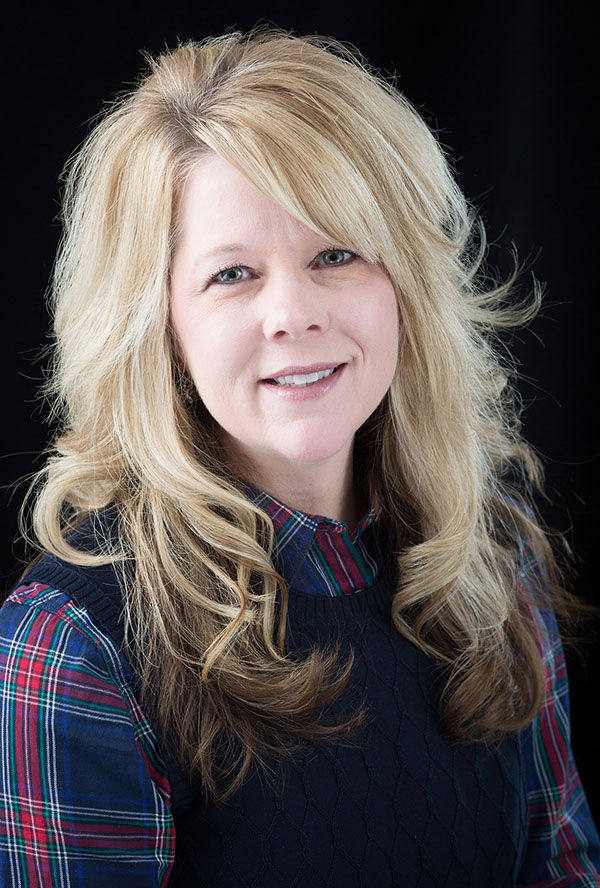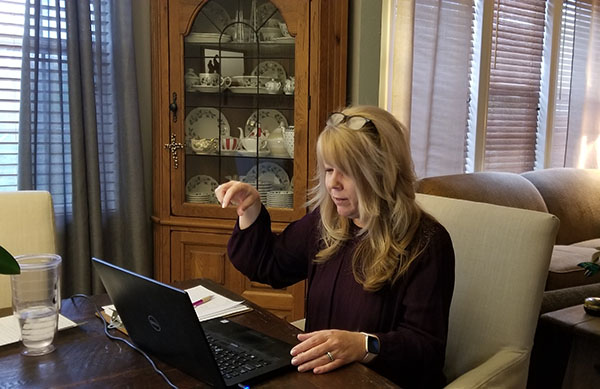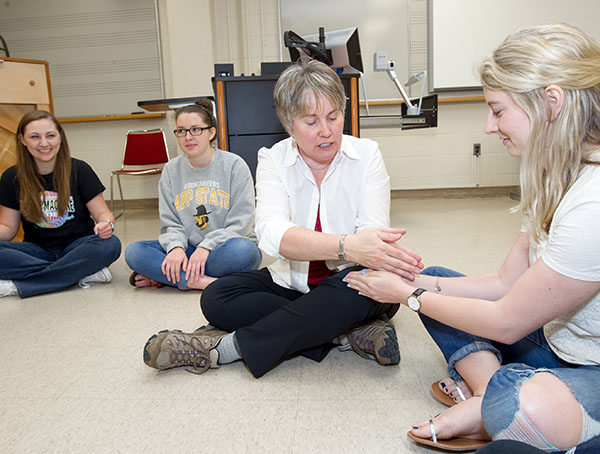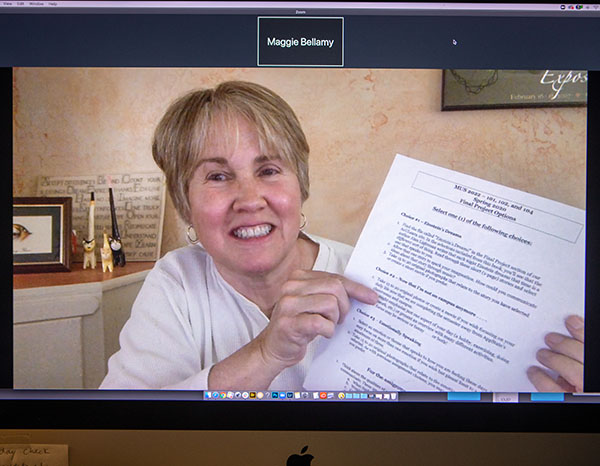BOONE, N.C. — At the beginning of the 2020 spring semester, no one at Appalachian State University could have imagined a complete transition to online learning — with only days to prepare. Yet that is what occurred in response to the COVID-19 outbreak, and faculty continue to perfect their flexibility.
While Appalachian regularly offers a number of online programs, adapting all courses to that format tested even Mountaineer resiliency. A variety of resources were made available to aid in the transition — including the Keep Teaching and Keep Learning websites and the Center for Academic Excellence’s Faculty Champions, who assisted their peers.
Yet, how do faculty make sure students feel connected and supported in online course delivery during the COVID-19 pandemic?
Four past recipients of the University of North Carolina Board of Governors Excellence in Teaching Award shared their experiences and strategies. Here are some of their tips.
How to engage students when you can’t be face to face
- Email often with information, resources — and words of encouragement.
- Find ways to connect students to one another. For instance, one professor had students drop a “pin” on a Google Map to indicate their general location.
- Use virtual breakout rooms for students to meet in small groups for discussions and collaborations.
- Offer virtual office hours by Zoom as another “touchpoint” with students.
- Provide a forum for “off-topic” discussions, in which students can talk about how they are coping with their unusual circumstances during the pandemic.
- Use both synchronous options (real-time events, such as videoconferencing or live chatrooms) to provide an opportunity to interact and asynchronous instruction (including recordings, discussion forums and email) to provide flexibility to students.
- Keep things simple, determining what is necessary in the curriculum.

D. Jason Miller, associate dean of Appalachian’s College of Fine and Applied Arts and associate professor in the college’s Department of Sustainable Technology and the Built Environment (STBE), in his classroom. Miller was the recipient of the 2019 UNC Board of Governors Excellence in Teaching Award for Appalachian. Photo by Chase Reynolds
Associate professor, Department of Sustainable Technology and the Built Environment
Associate dean, College of Fine and Applied Arts

Dr. Tracy W. Smith, a professor in Appalachian’s Department of Curriculum and Instruction, was the recipient of the 2017 UNC Board of Governors Excellence in Teaching Award for Appalachian. Photo by Chase Reynolds

Appalachian professor Dr. Tracy W. Smith, who has been at home teaching online since the coronavirus outbreak. Photo submitted
Professor, Department of Curriculum and Instruction

Dr. Lisa Runner, an associate professor of music education in Appalachian’s Hayes School of Music, center, was the recipient of the 2016 UNC Board of Governors Excellence in Teaching Award for Appalachian. Her classes are typically hands-on and interactive, and as she has transitioned her courses online, she has continued to focus on building community among her students. Photo by Marie Freeman

Dr. Lisa Runner, pictured April 17 in a videoconferencing meeting with a student. Photo by Marie Freeman
Associate professor of music education, Hayes School of Music

Dr. Tim Huelsman is a professor in Appalachian’s Dr. Wiley F. Smith Department of Psychology and the director of the Industrial-Organizational Psychology and Human Resource Management (IOHRM) master’s program. He was the recipient of the 2014 UNC Board of Governors Excellence in Teaching Award for Appalachian. Photo submitted
Professor, Dr. Wiley F. Smith Department of Psychology
Director of the Industrial-Organizational Psychology and Human Resource Management (IOHRM) master’s program
What do you think?
Share your feedback on this story.
About the College of Fine and Applied Arts
Appalachian State University’s College of Fine and Applied Arts is a dynamic and innovative group of seven academic departments, bringing together a variety of perspectives, experiences and real-world education to provide unique opportunities for student success. The college has more than 3,500 undergraduate and graduate majors. Its departments are Applied Design, Art, Communication, Military Science and Leadership, Sustainable Development, Sustainable Technology and the Built Environment, and Theatre and Dance. Learn more at https://cfaa.appstate.edu.
About the Reich College of Education
Appalachian State University offers one of the largest undergraduate teacher preparation programs in North Carolina, graduating about 500 teachers a year. The Reich College of Education enrolls more than 2,000 students in its bachelor’s, master’s, education specialist and doctoral degree programs, with offerings that span multiple fields — from teacher preparation, counseling, and therapy, to higher education, school and student affairs administration, library science, educational leadership and more. With over 10,000 alumni employed in North Carolina public schools, there is at least one Reich College graduate in every county in the state. Learn more at https://rcoe.appstate.edu.
About the Hayes School of Music
The Hayes School of Music prepares young musicians for professional lives as performers, composers, music educators, music therapists, conductors and music industry professionals, ensuring the next generation of musical leadership for the state, region and nation. Noted for quality instruction by national and internationally recognized faculty musicians, the school offers four undergraduate degree programs and three graduate-level programs. Learn more at https://music.appstate.edu.
About the College of Arts and Sciences
The College of Arts and Sciences (CAS) at Appalachian State University is home to 17 academic departments, two centers and one residential college. These units span the humanities and the social, mathematical and natural sciences. CAS aims to develop a distinctive identity built upon our university's strengths, traditions and locations. The college’s values lie not only in service to the university and local community, but through inspiring, training, educating and sustaining the development of its students as global citizens. More than 6,800 student majors are enrolled in the college. As the college is also largely responsible for implementing App State’s general education curriculum, it is heavily involved in the education of all students at the university, including those pursuing majors in other colleges. Learn more at https://cas.appstate.edu.
About the Walker College of Business
The Walker College of Business at Appalachian State University delivers transformational educational experiences that prepare and inspire students to be ethical, innovative and engaged business leaders who positively impact their communities, both locally and globally. The college places emphasis on international experiences, sustainable business practices, entrepreneurial programs and real-world applications with industry. Enrolling nearly 5,000 students, including more than 4,500 undergraduates across 11 majors, the Walker College of Business has the highest full-time undergraduate enrollment in the University of North Carolina System. App State’s Walker College is accredited by AACSB International — the premier global accrediting body for business schools. Learn more at https://business.appstate.edu.
About Appalachian State University
As a premier public institution, Appalachian State University prepares students to lead purposeful lives. App State is one of 17 campuses in the University of North Carolina System, with a national reputation for innovative teaching and opening access to a high-quality, cost-effective education. The university enrolls more than 21,000 students, has a low student-to-faculty ratio and offers more than 150 undergraduate and 80 graduate majors at its Boone and Hickory campuses and through App State Online. Learn more at https://www.appstate.edu.





![How NCInnovation Is Rethinking Economic Development in North Carolina [faculty featured]](/_images/_posts/2026/02/rethinking-economic-development-600x400.jpg)






